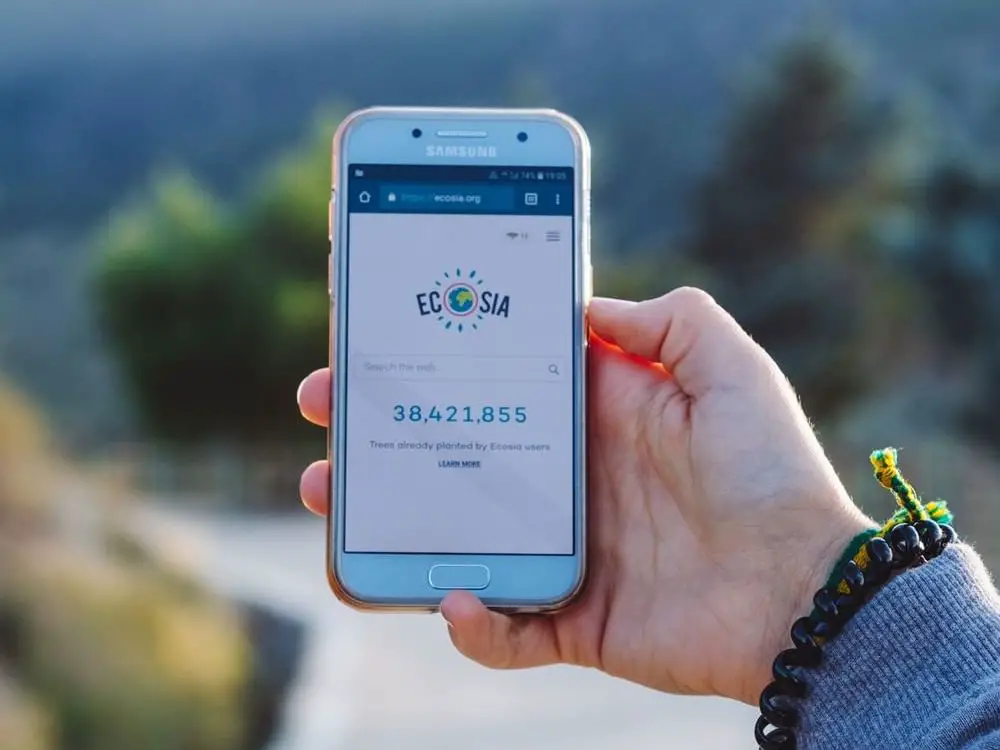If you are a college student, there’s a strong possibility that you have made numerous Google searches for research, navigating to your most-used websites or simply doing mindless searches. While you probably use Google, Yahoo, Bing or one of the other popular search engines, you could be using Ecosia, a greener alternative.
Changing the way that people navigate the internet, Ecosia provides an environmentally friendly search engine, planting trees with every search. For eco-conscious college students, this means there is a simple, effective way to help the environment while staying busy and immersed in classwork or research.
Ecosia was founded in 2009 after CEO Christian Kroll traveled around the world looking for inspiration to design a unique business model. After recognizing and understanding the impact of deforestation, Kroll created a business model that would reduce carbon dioxide emissions on a new scale; he then founded the search engine whose profits would work to reverse deforestation one search at a time.
With over 7 million active users, Ecosia is generating profits which will go toward sustainability and reversing deforestation. For every search made on their browser, Ecosia makes an average of .5 cents, based on the number of ad clicks, and 80 percent of these profits go towards tree-planting projects. For every 45 searches made through Ecosia, the company is able to plant a tree and, as of May 30, they have contributed to the planting of 58 million trees worldwide.
https://www.instagram.com/p/BwR_2Jyg1EE/
According to the Ecosia website, the browser “supports over 20 tree-planting projects in 15 different countries; Peru, Brazil, Madagascar, Nicaragua, Haiti, Colombia, Spain, Morocco, Senegal, Burkina Faso, Ghana, Ethiopia, Uganda, Kenya, Tanzania and Indonesia.”
They hope to have an overall positive impact on the world’s carbon footprint, saying, “If Ecosia were as big as Google, it could absorb 15% of all global carbon dioxide emissions! That’s enough to offset vehicle emissions worldwide.” In addition to planting trees, the browser also aims to reduce their own carbon footprint by running their serves on solar panels, which replaces electricity driven by fossil fuels.
Ecosia is paving the way toward greener web options, but how does it compare to other search engines? At first glance, Ecosia has a landing page similar to Google’s, featuring simple designs and intuitive navigation. Their usability and appearance are nearly identical and, after making a search, the results page is similar across Google, Bing and Ecosia; however, the main difference lies within the results of the search.
Ecosia’s searches are driven by Bing, which is owned and operated by Microsoft. Though the search engine result pages (SERPs) are generated from the same provider, the results differ. According to Search Engine Watch, “While Ecosia still uses Bing results and ads, it lags behind both Bing and Google for intuitive, rich SERPs.”
Having used Ecosia for the past two semesters, the results don’t compare to that of Google while doing in-depth research. There is a very distinct difference between the two in terms of efficient searching. For simple definitions, Google pulls from its own dictionary to provide users with quick, more efficient results, an algorithm that Ecosia does not provide.
While the results are not optimal, they are more than offset by their mission and other user-friendly qualities. According to Android Pit, “There are also basic privacy features: all searches are SSL-encrypted, your data isn’t sold to advertisers, and your search and browsing history isn’t tracked.”
Ecosia makes for a reliable, minimalist browser and will prove beneficial to college students looking for a Google alternative through not only their approachable, easy-to-use platform, but through their environment-focused organizational mission as well.
As a part of their eco-friendly model, they keep count of the number of searches an individual makes on each device. Every month, the Ecosia team sends out documentation on how they spend the company’s revenue.
Despite a few technical drawbacks to adopting a green browser, college students around the world are beginning to push for installation on their personal and on-campus computers as a default search engine.
Abigail Schumacher, a third-year senior at Penn State University, thinks the company’s eco-first approach is laudable. “I think the eco-friendly approach is super effective,” she says. “I really liked how, if you clicked on their icon, it took you to a page where they explain it and showed you where they were planting trees. They express their goals in a way that catches people’s eye.”
Other students are taking Ecosia beyond just personal use. In February 2019, a team of students from Ohio State University proposed that their university install the browser onto the 30,000 on-campus computers in the Smart Campus Challenge, a sustainability competition held by the Ohio State Energy Partners. Having won the competition, the team now has $40,000, which they plan on spending on marketing initiatives, promoting the browser itself and holding a week of events titled Time for Change.
https://www.instagram.com/p/BqW_hH7AjV1/
In the U..K., students at the University of Sussex are sparking a spread in the adoption of Ecosia as their default browser, as well. Fred Henderson, a student at the University of Sussex, along with two friends, started an awareness campaign and were able to make Ecosia the default at their university. Students from the University of Manchester, the University of Kent and Newcastle University are currently following in their footsteps in the wake of the successful campaign.
Ecosia has also partnered with universities, including the State University of New York at Oswego, in their sustainability projects to raise awareness and educate students on paper use and waste. Students, with the help of these programs, are becoming more aware of the large number of paper products they use. Students at the University of East Anglia, in England, have even created online petitions to have their university switch over.
Many students see the pros of establishing this eco-friendly browser as the default search engine on university computers, despite a few drawbacks. Ecosia provides a no-hassle way for college students to help the environment while they’re up to their elbows in exams and essays.
















